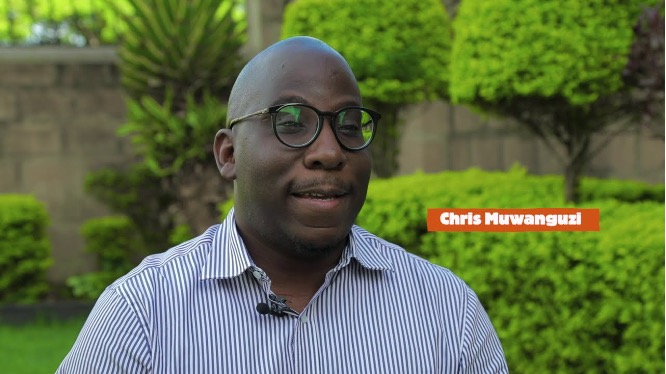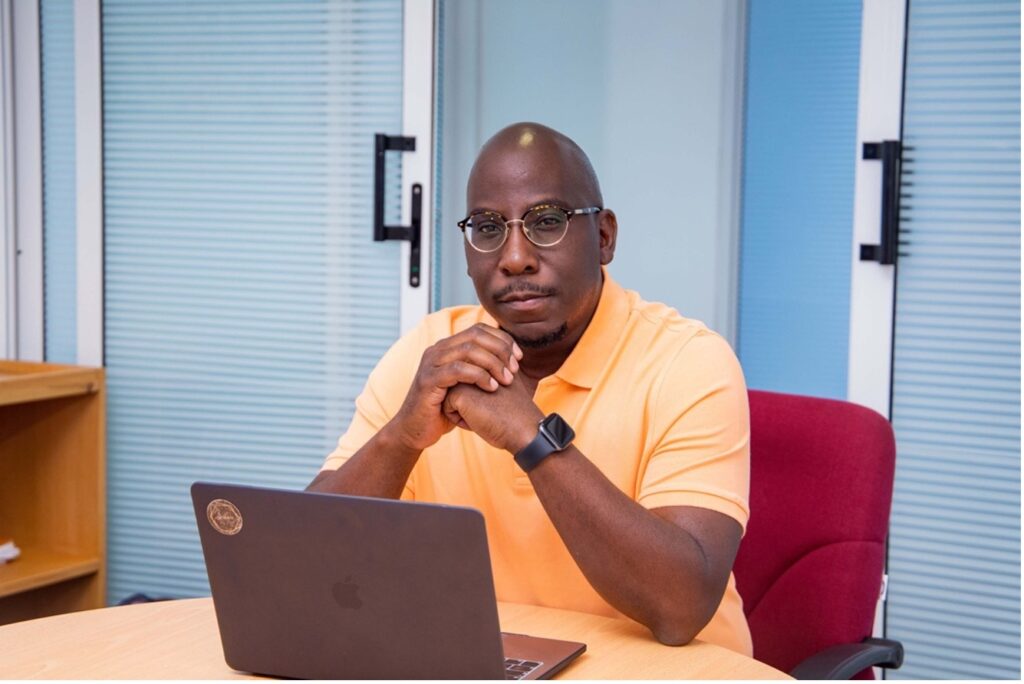Christopher Muwanguzi is the CEO of Child’s i Foundation, a non-profit organisation committed to making sure that every child in Uganda, East Africa, and around the world grows up in a safe and loving family, rather than in an orphanage. Their teams are based in the UK and Uganda.
Christopher has over 20 years of experience steering international development organisations. As a business leader, he sits on various boards tackling complex challenges such as childcare reform and social inclusion.
Christopher’s expertise is in creating sustainable change by addressing the root causes of issues, advocating for better policies, and building partnerships that deliver a greater global impact.
Chris, it’s been a while, and it’s great to catch up. What motivated you to work in the charity sector and now become CEO of Child’s i Foundation?
Thanks for having me, Mimi. Let me start by telling you the problem that we’re trying to solve, and then I’ll tell you what motivated me to get here.
Across the world, 5.4 million children live separated from their families in institutional care—often unnecessarily. These children are caught in cycles of poverty, discrimination (from either being born a girl or with a disability), or lack of access to essential services like healthcare or education.
Growing up in Uganda, there was an ancestral response to the way people dealt with children whose parents died or were unable to look after them for various reasons.
In the kind of system I grew up in, you had many people from grandparents, aunties, uncles or neighbours come through your house to help raise you.
My motivation comes from that. I believe in empowering communities to find family-based solutions, as I’ve personally experienced the power of extended families stepping up to care for children.
The care issue is a big issue globally, especially in the global north, such as America and the UK. So much money is spent on the care system, yet we should be spending money on preventing the issue.
It’s about strengthening families, transforming communities, and building systems that support alternatives to institutional care.
My journey began when I became a CEO at 27, leading the Family Matters Institute in the UK. I was inspired by a mentor who taught me that solutions are not just about fixing problems—they’re about building people and empowering communities.
With so many charities to support, what drew you to this cause?
My passion for this cause is deeply rooted in my upbringing in Uganda, where I witnessed the challenges of poverty and the incredible resilience of people around me.
While my family wasn’t in poverty, I had a close friend whose father travelled over 40 miles by bicycle to take him to school.
Yet, in school, we were equals, and my friend, a brilliant mind, showed me the transformative power of opportunity and education.
These experiences taught me the importance of creating systems that protect and uplift individuals, especially children.
In your day to day, what are the biggest challenges you face, and how do you navigate them?
One of the biggest challenges I face daily is fundraising.
Securing income to support our work is difficult, especially when it often involves convincing people who lack the context or connection to our cause.
There’s a disparity in global funding, and I regularly come across resistance rooted in systemic issues like racism, where people may see Africa’s challenges as “not their problem.”
This means I spend significant time persuading donors with unrealistic expectations.
For example, they might ask for complex outcomes while providing insufficient funding and no overhead support, and ask us to fill out 50 different forms – and even then, you still may not get the funding.
But beyond fundraising, I wrestle with the global issue of children leaving care. Many leave with little to no life skills—not knowing how to find a job, how to budget or build relationships. These gaps often lead to poor mental health outcomes, with high rates of PTSD, depression, and anxiety.
To navigate these challenges, I focus on building grassroots philanthropy models that are contextually relevant, not just for Africa but for global solutions.

Christopher often appears in the media advocating for social change, including appearing on Good Morning Britain.
I’m sure no day is ever the same; but how would you broadly describe a typical day?
My day begins with family—it’s my grounding and a reminder of why my work matters.
I start by waking up my 6-year-old daughter for school and helping my 11-year-old son get ready. We recite motivational phrases that remind us why we’re all special, as parents, too, so not just for the kids.
I see the kids off to school and drop my wife off at the station for her commute to work.
Once the family is off, I dive into emails and onto my to-do list. I’m a bit old-school, so I like to type out my tasks and get the satisfaction of ticking them off as I go. This helps me prioritise my day.
The mornings are often about organising priorities, responding to emails, and planning.
Afternoons typically shift to advocacy work, whether meeting with national governments and global organisations or connecting with frontline staff in Uganda to stay grounded in the realities of our work.
Fundraising is also a significant part of my day, from prospecting to following up on opportunities. It’s always rewarding when I uncover promising leads that can help us move closer to our mission. The good news is that this morning, I found three amazing opportunities.
No two days are ever the same, but my usual work rhythm involves balancing family, strategy, advocacy, and fundraising.
How do you make sure that your frontline staff are motivated and aligned with your organisation’s mission?
We’re a small, close-knit team—three in the UK, including myself, and 30 in Uganda. To keep everyone motivated, we prioritise culture, well-being, and clear communication.
Three years ago, we created a Head of People, Governance, and Culture role to focus on happiness and inclusion.
This has been pivotal in shaping a positive, supportive work environment. For example, we run an “Inner Programme” with weekly activities like fitness games, which I join remotely, and progress updates to help us stay connected and engaged across teams.
We also celebrate wins, big and small—whether it’s a child going home or securing vital funding. Storytelling plays a big role; we highlight individual and team successes to remind everyone why our work matters.
What strategies do you use to remain financially sustainable as a charity?
The last few years have been tough for charities, with many cutting back or closing. It’s always sad to see such losses, and it’s also been a challenge for us. Since taking over as CEO in 2019, I’ve had to make significant cost reductions while working hard to maintain our team and operations.
A key strategy has been diversifying our funding sources to avoid reliance on one stream. This includes grants from trusts and foundations, corporate partnerships, major donors, and community fundraising events. For example, we’re hosting two community events this December—a jewellery shopping night and a nostalgic gaming arcade fundraiser—both aimed at engaging supporters in creative ways.
We’ve also focused on building long-term relationships with donors who truly believe in our mission. Changing systems and addressing deep-rooted societal issues like those we tackle takes decades, not a single year. Having committed donors who understand and support our long-term vision has been critical to our sustainability.
While it hasn’t been easy, these diversified efforts and strong donor relationships have helped us navigate financial challenges and keep moving forward.
How do you decide which projects or initiatives your charity should focus on?
Our decisions are guided by a clear strategy called FAMILY, which has three core objectives and is rooted in three principles: need, impact, and sustainability.
We begin by listening to the communities we serve to understand their needs. Then, we innovate to create impactful and sustainable solutions.
For example, one of our objectives is to provide family-based alternatives for children who cannot return to their immediate families. In western Uganda, we partnered with a grassroots organisation supporting 20,000 grandmothers. These grandparents are often the backbone of their families, caring for grandchildren despite limited resources.
Together, we scaled their peer-support programme, incorporating microfinance and community structures while advocating for government recognition of their role. This partnership not only addresses the immediate needs of children but also empowers grandparents to become self-reliant.
The impact has been incredible and transformed lives – I’ve met grandparents who are starting businesses and supporting their families independently.
When you look at alternatives to the care system for relatives who might be able to take in a child, finances are often the biggest barrier, but you’ve created some incredible solutions to this barrier.
What’s truly remarkable is how grandparents, often disregarded by society, become some of the best educators and caregivers. Many are in their 50s or 60s—still active and resourceful.
However, to truly support them, we also need to address the physical and mental health challenges they face—something we are working hard to tackle.
Can you share other success stories that highlight the impact of your charity’s work?
A recent success story is our collaboration with the African Union to address care reform on the continent.
Through a collective effort with grassroots organisations and global supporters, we successfully advocated for a groundbreaking policy shift: the African Union’s first position paper on ensuring every child’s right to a family and sense of belonging.
This paper is a critical step toward tackling the root causes of family separation, such as poverty, disability stigma, and gender inequality.
The policy is already driving change, with countries like Kenya and Rwanda implementing care reform strategies. Uganda too now has one in draft.
Beyond policy, we’re also seeing cultural shifts. For example, in often patriarchal societies, local leaders reflect on how they were once children and become more open to prioritising children’s rights and family unity.
By supporting women-led businesses and encouraging shared household responsibilities, we’re helping create more equitable environments for girls and boys.
This work exemplifies our mission: to inspire systems change by connecting African practices with global solutions while empowering communities to lead their own transformations.
Finally, with such a demanding role, how do you like to unwind?
For me, unwinding is all about family, reflection, and finding joy in simple, meaningful moments.
Over time, I’ve learned to pause, take deep breaths, and step back when needed. After losing a close friend three years ago, I realised that you can’t tackle external challenges if you don’t take care of yourself first.
Friday evenings, we dance together as a family in the kitchen, which brings such a release after a long week. My son’s growing interest in hip-hop has even turned into a bonding opportunity. We explore its roots and positive messages, using music as a way to connect, educate, and have fun.
I dedicate a few weeks every summer and at Christmas to fully disconnect from work.
I also find peace in writing and nurturing my spiritual side. Sundays are dedicated to faith and gratitude, reminding me that I am “blessed and highly favoured.” This mindset helps me stay positive, even during challenges.
Ultimately, spending time with my wife and children and being fully present with them reminds me of my deeper purpose—not just being a CEO but also a husband and father. That balance is what keeps me grounded and energised.
Thanks, Chris, for your time and inspiring vision for your organisation and the world. There is so much we can take away from it.

Learn more about Christopher as a leader, mentor, coach and speaker on topics such as wellbeing and social inclusion.
